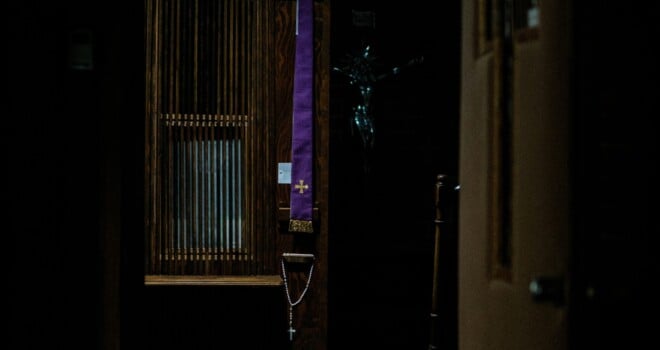An interesting reality to be constantly aware of—the devil never goes on vacation! He works day and night but is especially alert to the times we are idle, lazy, and “taking a vacation” from God. In one of his letters, Saint Peter compares the devil to a roaring lion on the prowl, looking for someone to devour. We must resist him.
One of his major attacks is against the practice of and the reception of the Sacrament of Confession. Being highly astute and with a perverted intellect, bent on evil, and pursuing our condemnation and damnation, the devil never ceases providing reasons not to approach God. This is most evident in the reception of the Sacraments, and most especially the Sacrament of Reconciliation.
Let us then pull the mask from the “Father of lies and the deceiver” with respect to his astute tactics in luring us away from God’s infinite mercy channeled through the Sacrament of Confession. No doubt the devil is a consummate and professional liar; he knows how and when to lure us into his traps, but most especially in convincing us to either not confess, to postpone, procrastinate, or even to make bad confessions!
Let’s reveal his insidious and constant attacks.
1. Confess Directly to God
Many Catholics have been strongly influenced by a prevailing Protestant theology pertaining to Confession. How many times have we heard from Protestants and even Catholics: “I confess directly to God,” or “I do not need to confess to a person, but to God directly.” Jesus gave us the Sacrament of Confession that first Easter Sunday night, when He breathed on the Apostles, saying: “Receive the Holy Spirit, whose sins you forgive will be forgiven; whose sins you retain they shall be retained” (Jn 20:21-23). It might be easier to confess directly to God, but Jesus willed that we confess through another, the priest, who acts in persona Christi, meaning in the person of Christ, in the Sacrament of Confession.
2. The Priest is Only a Man
Another objection often levelled against Confession is: “Well, the priest is just a human being, like me, and he is a sinner. Why should I confess to a sinner like myself?” True! The priest is a sinner and has to go to confession to another priest to receive absolution for his own sins. (Even the Pope has to go to confession to another priest!) However, a validly ordained priest has been given the power and grace from Holy Orders to act in the person of Christ and to forgive sins in the name of the Lord Jesus, the true Divine Physician. Jesus also said: “Whoever hears you hears me.” Christ communicates His grace of healing and forgiveness through the ministry of the priesthood.
3. The Priest is Too Busy for a Sinner Like Me
This is an obvious lie of the devil. We all have the same timeframe every day, irrespective of who we are, where we live, and the circumstances in which we find ourselves. Priests are busy but should find the time, place, and availability to hear the confession of the souls that are entrusted to them. According to Canon Law, the faithful have a right to go to confession to their Pastor, if circumstances permit it. What is more important than reconciling a sinner to God, procuring the pathway towards his eternal salvation?
4. The Priest Gets Angry at Me!
In Divine Mercy in My Soul, Saint Faustina Kowalska writes about a time when one of her confessions didn’t seem to go well, as if the priest did not understand her. When Jesus communicated to her afterward, He revealed the reasons for her not being at peace after that Confession: she did not pray for the priest before she entered the confessional. Make it a habit to pray for the priest before you enter the confessional—this can pave the way for a peaceful and efficacious confession.
5. I Do Not Know the Commandments
Material is abundant on how to confess as well as on the ten commandments, examinations of conscience, etc. You can purchase booklets; you can look them up online; or check out your local church. In our parish, outside the door of my confessional is a pamphlet rack filled with brochures detailing the commandments as an efficacious guide for examining one’s conscience.
6. I am Afraid and Ashamed
Paralyzing fear and shame comes from the evil one, never from God. Saint Philip Neri pointed out that the devil expertly takes away our fear and shame when he convinces us to choose sin, but when we are beckoned to return to God through Sacramental Confession, he can lie to us so much that we become paralyzed and never make it into the confessional. The devil never goes on vacation, especially in his work to prevent us from approaching the confessional.
7. My Sins Are So Serious that They Go Beyond God’s Forgiveness
It is interesting in meditating upon the diary of Saint Faustina that Jesus stated unequivocally, with utmost clarity and emphasis, that the sin (especially an interior attitude) that offends Him most is the unwillingness to trust in His Infinite Mercy. In fact, there is no sin that is so grave or serious that the Infinite Mercy of the Heart of Jesus cannot forgive. Jesus said to Faustina that the greatest sinner can be the greatest saint, under one condition: TRUST, TRUST, TRUST!!! In the image of Divine Mercy, we read and pray: JESUS, I TRUST IN YOU! Saint Paul reiterates the same concept in these words: “Where sin abounds, the mercy of God abounds all the more” (Romans 5).
8. My Sins Will Be Known!
Not in the least! The seal of confession is one of the most serious obligations in the office of the priesthood. This means that the priest is obliged under pain of excommunication to maintain the absolute secrecy of all that has been said in the context of Confession. There have been saintly priests who have actually been martyred to maintain the inviolable seal of the confessional. (Read up on the priest Saint John Nepomucene! His life and death is one such example.)
9. I Will Just Go Tomorrow When I’m Ready
This is one of the most common arrows that the devil pulls from his quiver, ready to shoot for the kill in every time and place. In any enterprise or activity, we are never going to be perfectly ready and prepared. Only God is perfect! However, especially if we find ourselves in a state of sin, a state of moral danger, then under no circumstances should we put off our confession. We do not want to play Russian roulette with our salvation. Saint Anthony Mary Claret gave the example of a house on fire. Never would we delay in calling the firemen. But many live risking the fires of hell by living in mortal sin and do nothing to put out the flames in their lives!
10. Why Go to Confession When I Will Fall into the Same Sin Again?
This might be the case, but frequent confession can serve as a great help to gradually overcome our moral transgressions. Moral theology teaches priests to be patient with sinners and to apply the theological principle of graduality or progressivity. This means that the priest as father, friend, helper, and healer can gently help the penitent to gradually overcome what might be his moral kryptonite or major sin. In this way, with the help of God’s grace and the pursuit of frequent confession, the sin might be committed less seriously as well as less frequently, and then one day conquered completely! What is important on the part of the penitent is trust in God’s mercy, to try to avoid the near occasion of sin, and to put forth good will and every effort.
My friends and fellow sinners, we hope that exposing and discrediting these obstacles that impede us from receiving the Sacrament of Confession can help us all to overcome the wiles of the evil one and approach God’s throne of mercy frequently, faithfully, fervently, and fully confident in His infinite forgiveness.
Jesus, I trust in You!
Photo by Grant Whitty on Unsplash












